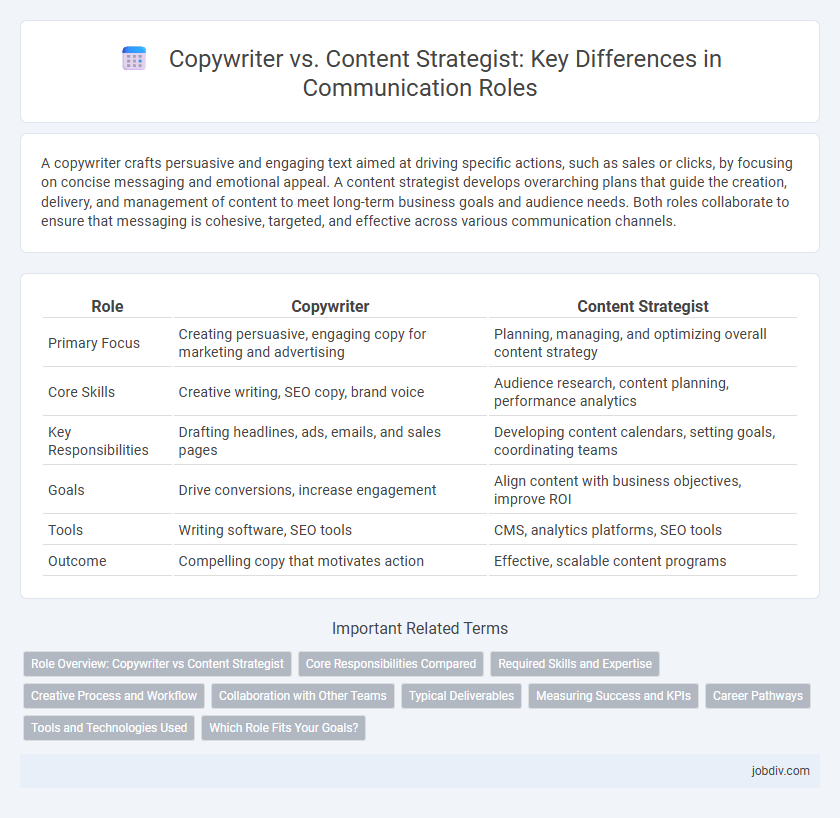A copywriter crafts persuasive and engaging text aimed at driving specific actions, such as sales or clicks, by focusing on concise messaging and emotional appeal. A content strategist develops overarching plans that guide the creation, delivery, and management of content to meet long-term business goals and audience needs. Both roles collaborate to ensure that messaging is cohesive, targeted, and effective across various communication channels.
Table of Comparison
| Role | Copywriter | Content Strategist |
|---|---|---|
| Primary Focus | Creating persuasive, engaging copy for marketing and advertising | Planning, managing, and optimizing overall content strategy |
| Core Skills | Creative writing, SEO copy, brand voice | Audience research, content planning, performance analytics |
| Key Responsibilities | Drafting headlines, ads, emails, and sales pages | Developing content calendars, setting goals, coordinating teams |
| Goals | Drive conversions, increase engagement | Align content with business objectives, improve ROI |
| Tools | Writing software, SEO tools | CMS, analytics platforms, SEO tools |
| Outcome | Compelling copy that motivates action | Effective, scalable content programs |
Role Overview: Copywriter vs Content Strategist
Copywriters specialize in crafting persuasive, engaging text aimed at driving immediate action or conversions, focusing on compelling headlines, calls-to-action, and product descriptions. Content strategists develop comprehensive plans that align content with business goals, audience needs, and brand voice, emphasizing content audits, editorial calendars, and performance metrics. Both roles collaborate to ensure messaging consistency and maximize audience impact across multiple channels.
Core Responsibilities Compared
A copywriter crafts persuasive and engaging text aimed at driving specific actions such as sales or sign-ups, focusing on clear, concise messaging tailored to target audiences. A content strategist develops comprehensive plans that align content creation with business goals, involving content audits, audience research, and channel selection to optimize reach and engagement. While copywriters hone in on message execution, content strategists oversee the overall content lifecycle to ensure consistent brand storytelling and long-term impact.
Required Skills and Expertise
Copywriters excel in crafting persuasive, engaging text tailored to target audiences, with strong skills in storytelling, SEO, and brand voice consistency. Content strategists require a deep understanding of market research, audience analysis, and content planning to create cohesive, goal-driven communication frameworks. Both roles demand proficiency in digital tools, data interpretation, and collaboration to effectively align content with business objectives.
Creative Process and Workflow
Copywriters focus on crafting compelling, persuasive text tailored to specific audiences, using creativity to engage readers and drive conversions through targeted messaging. Content strategists develop comprehensive plans that align content goals with business objectives, orchestrating research, audience analysis, and editorial calendars to ensure consistent brand voice and efficient delivery. The creative process for copywriters centers on ideation and writing, while content strategists oversee workflow by coordinating teams, analyzing performance metrics, and optimizing content across multiple channels.
Collaboration with Other Teams
Copywriters and content strategists collaborate closely with marketing, design, and product teams to ensure cohesive messaging and brand consistency. Copywriters craft targeted, persuasive text while content strategists align content plans with business goals and audience insights. Their teamwork enhances campaign effectiveness by integrating creative storytelling with data-driven strategies.
Typical Deliverables
Copywriters typically produce engaging and persuasive texts such as advertisements, blog posts, and social media content designed to capture audience attention and drive conversions. Content strategists develop comprehensive plans including content calendars, audience personas, and SEO strategies to ensure cohesive brand messaging and optimal content performance. The collaboration between both roles enhances content effectiveness by combining creative copy with strategic insights.
Measuring Success and KPIs
Copywriters primarily measure success through engagement metrics such as click-through rates, conversion rates, and content readability scores, which directly reflect the effectiveness of their messaging. Content strategists focus on broader KPIs including audience growth, content performance across multiple channels, and alignment with business objectives to ensure long-term impact. Both roles require data-driven analysis but leverage different key performance indicators to evaluate communication effectiveness.
Career Pathways
Copywriters typically develop strong skills in persuasive writing and brand messaging, making them ideal for roles centered on advertising and marketing campaigns. Content strategists focus on planning, creating, and managing content ecosystems, often advancing to roles that require analytical thinking and cross-functional coordination. Career pathways for copywriters may lead to senior creative roles, while content strategists often progress to content director or digital marketing manager positions.
Tools and Technologies Used
Copywriters primarily use tools like Grammarly, Hemingway Editor, and Google Docs to craft clear, engaging copy and ensure error-free content. Content strategists leverage advanced platforms such as SEMrush, Trello, and Google Analytics to plan, optimize, and measure content performance across multiple channels. Both roles depend on collaboration tools like Slack and Asana for efficient project management and communication.
Which Role Fits Your Goals?
A copywriter crafts persuasive, concise messages aimed at driving immediate action, making them ideal for projects focused on sales and direct response. A content strategist develops comprehensive plans that align content with long-term business goals, ensuring consistency and audience engagement across multiple platforms. Choose a copywriter if your priority is compelling, goal-driven text; opt for a content strategist to create cohesive, sustainable communication strategies that support growth.
Copywriter vs Content Strategist Infographic

 jobdiv.com
jobdiv.com